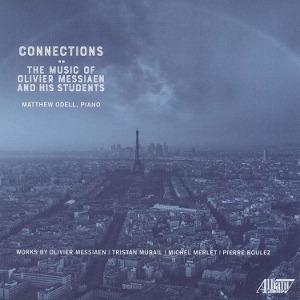Damon Sink
 Connections: The Music of Olivier Messiaen and His Students. 2019. Matthew Odell, Piano. Albany Records TROY1759. Digital Download, 24 Tracks (2 hours, 19 minutes). ITunes or https://www.albanyrecords.com/mm5/merchant.mvc?Screen=PROD&Store_Code=AR&Product_Code=TROY1759&Category_Code=a-NR. $16.99
Connections: The Music of Olivier Messiaen and His Students. 2019. Matthew Odell, Piano. Albany Records TROY1759. Digital Download, 24 Tracks (2 hours, 19 minutes). ITunes or https://www.albanyrecords.com/mm5/merchant.mvc?Screen=PROD&Store_Code=AR&Product_Code=TROY1759&Category_Code=a-NR. $16.99
Pianist Matthew Odell’s new recording, The Music of Olivier Messiaen and His Students, brings together seven works spanning 64 years, three by Messiaen spread across his long career, and four by a collection of his students. While not attempting to draw a direct lineage in musical influence from teacher to pupils, Odell creates a fascinating dialogue between them in thoughtful pairings of works throughout.
Odell opens the recording with a student work of Messiaen, “Cloche d’angoisses et larmes d’adieu” (Bells of Anguish and Tears of Farewell), from the Huit Preludes (1928-29). The composer’s luxurious harmonic palette is already evident in this early work, glowing against the grounded centricity of the tolling titular ‘Bells.’ The work’s central “Tears of Farewell,” dripping as continuously falling eighth notes, are delicate in Odell’s performance, while the longer linear direction of the section is always distinctly audible behind the surface detail.
Tristan Murail’s Cloche d’adieu, et un soirire (Bells of Farewell, and a Smile), composed in memory of Messiaen in 1992, echoes the earlier work’s ringing bells, but here they do not ring with the clarity of single tones, but darker cluster chords, clouded in grief. Murail’s harmonic language certainly references his teacher’s unique voicing of chords, but now they reside in shadow, only finding sunlight in the work’s final moments.
Douze Notations (1945), by Pierre Boulez, perhaps Messiaen’s most famous student, is a set of miniatures all employing the same 12-tone serial row. Boulez goes for maximum variety between his movements, displaying great creativity stemming from a single pitch source. Some existing recordings of this work attempt to exaggerate the performance details in the score, perhaps to somehow compensate for the perceived difficulty of the modernist language. Odell’s interpretation lives firmly in the expectations of the composer’s score, succeeding in a great coherence of voicing and attention to pacing.
While Messiaen’s Petites esquisses d’oiseaux (Small Bird Sketches) was written 40 years after Boulez’s score, there is a great kinship between these works. Both are intensely gestural, singularly focused on one or two motives in each short movement. While Boulez generates twelve distinct moods with one serial row, Messiaen harmonizes his collection of bird songs with dizzyingly fast and difficult chord movements throughout.
Michel Merlet, a student of Messiaen’s in the 1960s, is represented by two works on this disc (both world premiere recordings): his Jeu de quatres (1973) and the Passacaille et fugue, Op. 36 (1986). While the former is a rich display of the possibilities of melodic and harmonic perfect fourths, the latter is a tour de force in the exploration of a single melodic theme. Merlet’s masterfully controlled dense contrapuntal textures (he taught fugue at the Paris Conservatoire) are expertly matched by Odell’s capacity to give each voice its own identity. The intense momentum of Merlet’s Fugue is maintained and built upon by the tenth movement from Messiaen’s Vignt Regards sur l’Enfant-Jésus (1944).
Matthew Odell’s thoughtful programming and ordering of works on this recording make for a rich and thought-provoking listening experience on the artistic relationship between teacher and student. The individuality of each composer is distinct here, and hints at the diversity of voices within the modernist movement. What is most impressive on the recording, however, is Odell’s ability to make such exhilaratingly virtuosic music so clean and vibrant in every moment. These composers are fortunate to have such a performer as their advocate.


